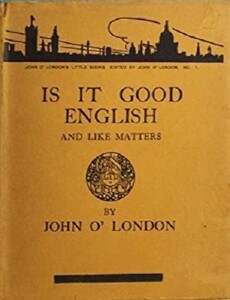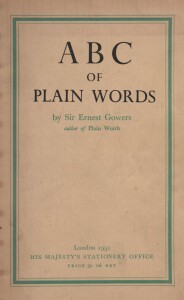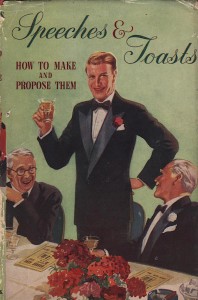Today, one of the commonest colloquial uses of the word ‘ case ‘, as in ‘This not the case’ is, according to one writer on correct grammar, an incorrect use of the word. Nearly a hundred years ago John O’London made his case, as it were, but this use of the word is still common. Let Mr O’London explain:-
‘The word ‘ case’ is a capital example of the words which, rightly used, mean something, but, wrongly, nothing at all. Mr R. W. Chapman, in…The Portrait of a Scholar and Other Essays writes: ‘ Case and instance are the commonest and most dangerous of a number of parasitic growths which are the dry rot of syntax’.
‘The word case implies a conjunction of affairs, an opposition of interests, a relation of circumstances to one another. Thus you may write of ‘ a case of conscience.’ But we are not to write, ‘ That is not the case, when all we mean is’ That is not so’; for a case is a position of things, relative to the things themselves or to the way in which they affect men. We shall find the word correctly used in the tenth verse of the nineteenth chapter of the Gospel of St. Matthew, ‘ His disciples say unto Him, If the case of the man be so with his wife, it is not good to marry.’ The word is used with correctness by the Friar in ‘ Much Ado about Nothing ‘ when he is advising Leonato how to act for the vindication of his daughter: ‘ Pause awhile and let my counsel sway in this case.’ But, as Mr Chapman points out, it is wrong to write, ‘ It is not the case that Napoleon died of a broken heart,’ because no case has been stated.’
Up and down.
Today we casually use the words ‘up’ and ‘down’ in conjunction with a destination without really being aware of why we choose one or the other of these two words. In 1924 a reader asked Mr O’ London what was the significance of this choice of word. ‘ Should ‘up’ be used when one is going to a larger town or is it geographically used—i.e. if the place be north or south of your position?’ Here is Mr O’ London’s reply:-
‘I do not think that ‘ up’ or ‘down have any original association with north or south. These terms originated in railway, or coaching parlance, and are governed by the relative and conventional importance of the two ends of a journey. Thus in railway speech, a Manchester man would say ‘up to London’, and a London man ‘ down to Manchester.’ But whether a Manchester man would say, in practice, ‘ up ‘ to Birmingham may be a solemn question. Personally, I should not say ( in London) that I was going ‘ down to Liverpool’, but ‘ up to Liverpool.’ ‘ Down to Liverpool’, though correct in railway language, seems a thought glib and pompous. I should consider it an impertinence to announce to a Scot my intention to go ‘ down to Edinburgh,’ even though Edinburgh is on the ‘ down’ line from London.’ Continue reading


 When some BBC journalists don’t know the difference between reticent and reluctant, and use the word enormity to mean an enormous event, popular grammarians, such as Liz Truss or Ernest Gowers, who was her equivalent in the 1950s, are needed more than ever. That’s if these pisspoor journalists can be bothered to read their books.
When some BBC journalists don’t know the difference between reticent and reluctant, and use the word enormity to mean an enormous event, popular grammarians, such as Liz Truss or Ernest Gowers, who was her equivalent in the 1950s, are needed more than ever. That’s if these pisspoor journalists can be bothered to read their books.